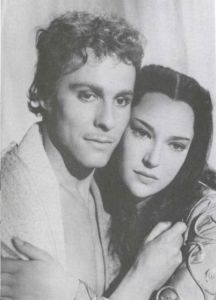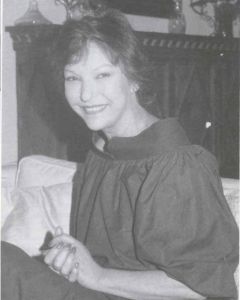Submitted by:
Tipu
Whatever became of ... June Duprez
From: Whatever became of ...
All new, tenth series
By: Richard Lamparski, 1986

| John Justin and June Duprez, along with the late Sabu, were the stars of The Thief of Bagdad (1940, the Alexander Korda production that won Oscars for Special Effects, Color Art Direction, and Color Cinematography |
|
The leading lady of the movies was born during an air raid in Teddington, England, on May 14, 1918.
Although her father was an American vaudevillian, her early acting ambitions were not taken seriously. June was allowed to join the Coventry Repertory Company because her parents believed the hard work required would soon discourage her.
She never developed a real ambition but enjoyed acting. Her first husband, a Harley Street physician, encouraged her to pursue a career. But after his wife became so well known through the success of Four Feathers (1939), he became jealous and possessive. Alexander Korda, the producer, moved the filming of The Thief of Bagdad (1940) to Hollywood and subsequently June and the doctor were divorced.
Her exotic beauty and slightly aloof manner were seen in The Cardinal (1936), U-Boat 29 (1939) [aka The Spy in Black] with Valerie Hobson, They Raid By Night (1942), And Then There Were None (1945), The Brighton Strangler (1945), That Brennan Girl (1946) with James Dunne and Mona Freeman, Calcutta (1947) with Alan Ladd, 1 + 1 (1961), and The Last Tycoon (1976).
Hollywood, where she lingered throughout World War II, was not to her liking. Korda and her agent set her price at $50,000 per picture. The steep salary, coupled with her slightly exotic beauty and somewhat cool manner, brought her career to a standstill. At one point she was so impoverished she nibbled on dog biscuits, which she covered with marmalade.
"Whenever you see a 'Sherlock Holmes!" movie, say a prayer for 'Dr. Watson,'" June has been quoted as saying. "Because if hadn't been for the kindness of Nigel Bruce and his wife, I just don't know what I'd have done in Hollywood. They kept me circulating socially when I was stagnating professionally. And the times they gave me dinner! But the very worst part was the men out there. I spent few minutes at a Barbara Hutton party talking with David O. Selznick. Later that same night he appeared at my door, and when I wouldn't let him in, he broke my window. Another time, on a warm day, I had my apartment door opened and in walked Harry Cohn - right into my house. I'd never met him. I didn't know who he was, even when he told me. When I told my agent that I nearly had him arrested, he told me that such a thing would have ruined me. Me! I had been assured that I was the prime contender for the lead in Sundown, the part that was to be the making of Gene Tierney, but after that horrible scene with Selznick, it was never again mentioned. You may wonder how a film to be made at one studio could be affected by another. By the simple fact that my agent was Myron Selznick, David's brother. It seems I had made a member of his family look foolish. Do you wonder why it's called a 'jungle'?"
Even when Cary Grant and Clifford Odets, the director, wanted June for None But the Lonely Heart (1944), the front office at RKO strongly objected to the casting. She believed that the movie contains her best screen work.

| This photograph of June Duprez (by Richard Lamparski) was taken in her London flat on August 17, 1984, less than three months before her death. She was sixty-six years old. |
|
According to author Charles Higham, June Duprez assisted the FBI during World War II in surveillance of Fascist sympathizers in Hollywood and activities of enemy agents in Mexico.
June left Hollywood at the first opportunity to move to New York - an offer to act with the company run by Margaret Webster and Eva Le Gallienne. Under their auspices, she appeared on Broadway in What Every Woman Knows and Androcles and the Lion. George S. Kaufman directed her in the Broadway production of Town House in 1948, the year in which she married a wealthy sportsman.
June has two daughters by that marriage. It ended in 1965. She lived in Rome for a number of years after the divorce.
In 1984 at the time of her last interview, she was living in a large garden apartment in the Knightsbridge area of London. She had a Siamese cat and a close relationship with a member of the English nobility. She was considering having some minor plastic surgery done & planned a trip to the United States to see her only grandchild, a boy. She died in her sleep on August 17, 1984.
Back to
Reviews



